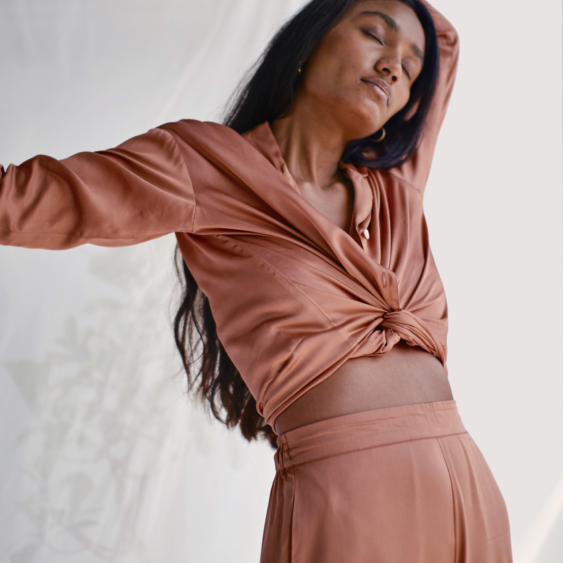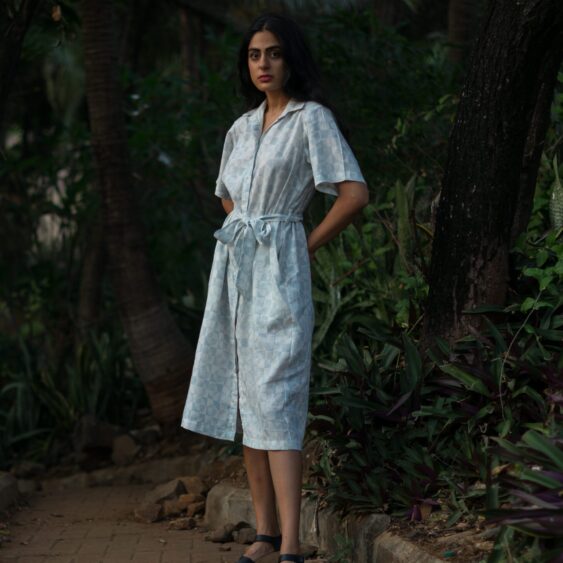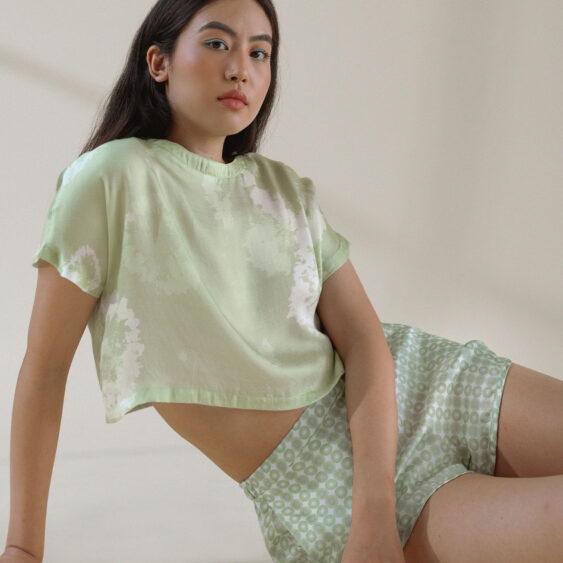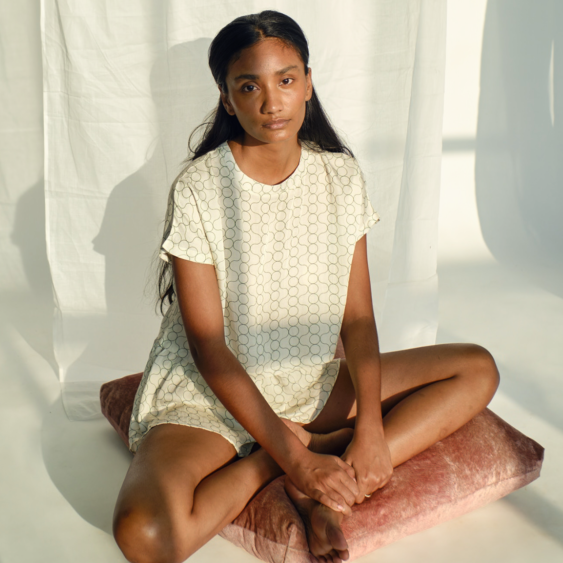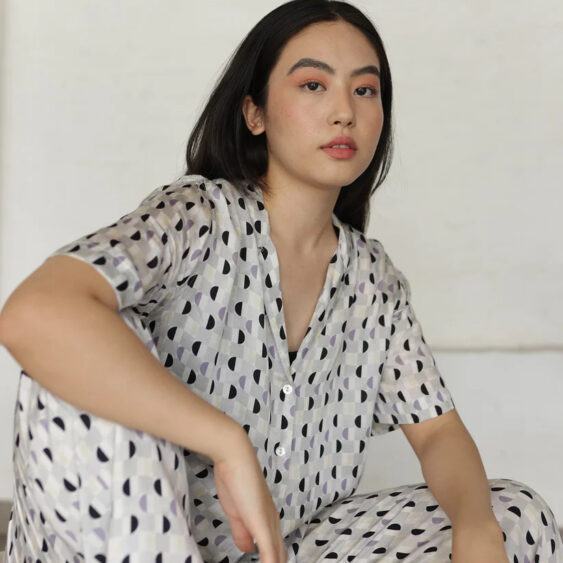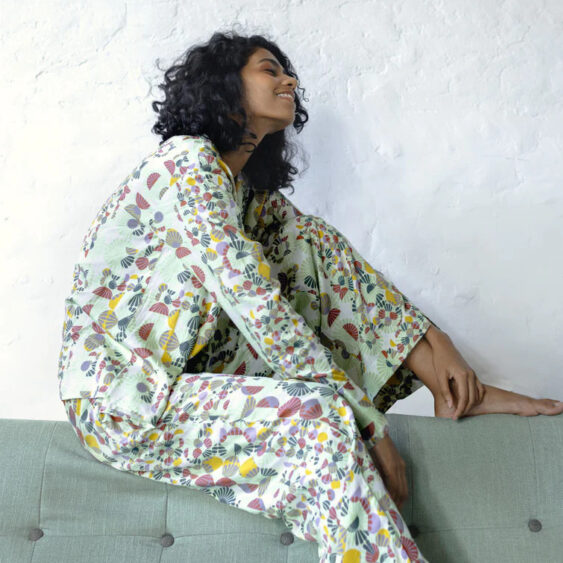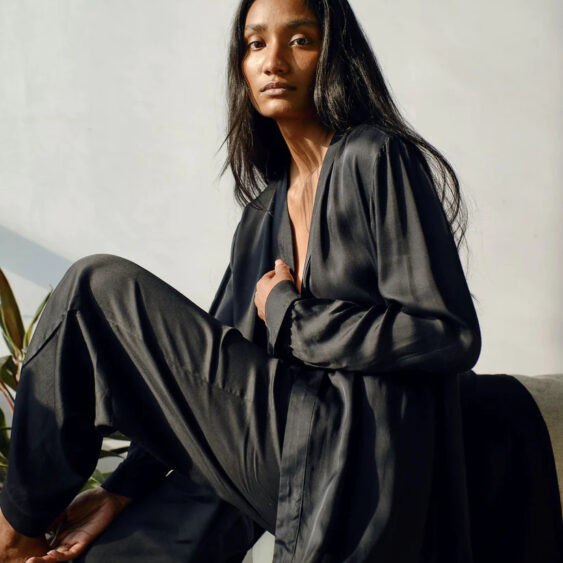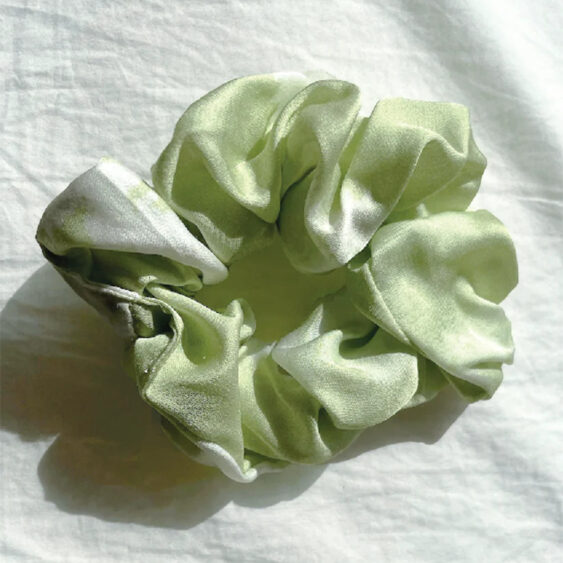

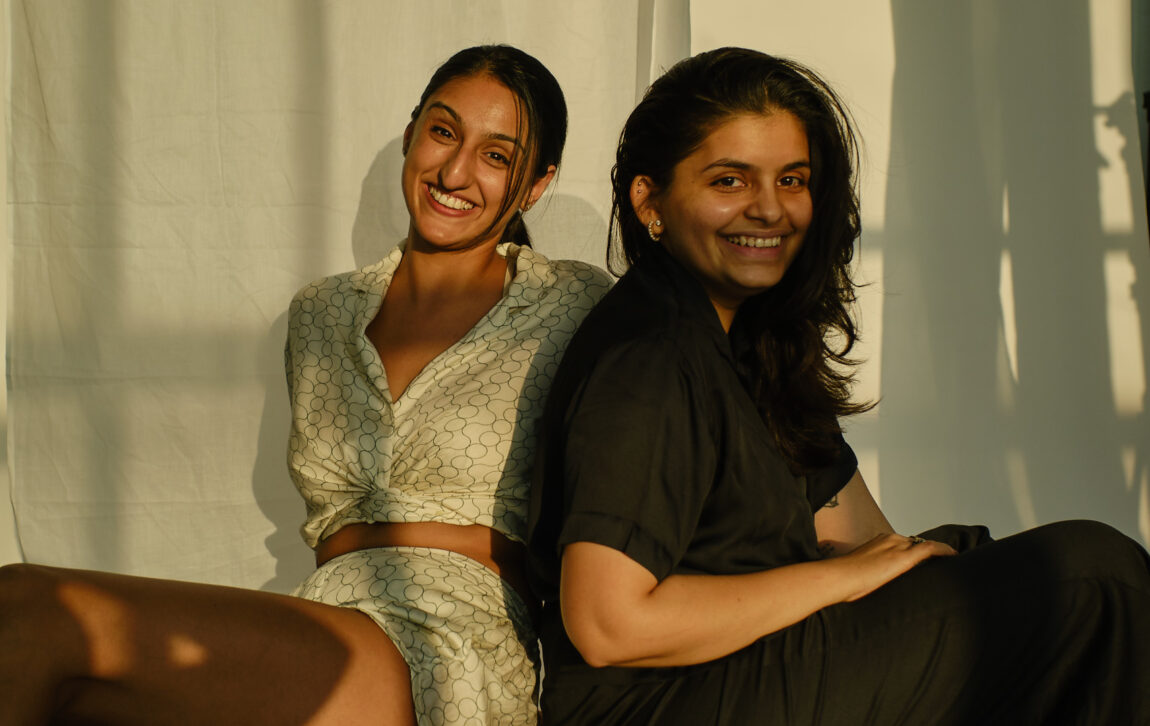
BRAND NAME - Lagom
FOUNDER - Roshni Kochhar & Parigna Desai
STARTED IN - January 2022
USP - Luxury Loungewear
Launched in the peak of the pandemic, ‘Lagom’ is a luxury loungewear brand that moves with you as you go about your day. Taking a material-first approach to designing, designers Parigna and Roshni wanted to create pieces that make you feel good even when you are lounging around at home. Working with luxurious fabrics like lotus and rose fibre, the founders speak to Blur The Border on the challenges of sustainable apparel and building a brand in a niche category in India.
Roshni & Parigna's Picks
Who is the one influencer you wish to see wearing your products?
Aditi Mayer
Nuria Val - founder of Rowse Beauty

Is there a podcast, book, or social media handle that you’ve found helpful for your business?
Book: Sprint - it is on UX strategy






If you could collaborate with any Indian or international brand, who would it be?
Iro Iro
BTB: How did you come up with the name for your brand?
PARIGNA: Lagom is essentially a Danish word that means ‘not too much, not too little, just right’ and that’s the kind of essence we wanted to work with. We started out with loungewear that people can live in and we thought ‘Lagom’ captured the ethos of what we are trying to do.
BTB: You both come from different design backgrounds, what made you both come together and start a loungewear brand?
PARIGNA: Roshni and I met through mutual friends and got familiar with each other’s work where our love for materials really stood out. We wanted to explore what alternatives are out there and what we can create with them. So with the materials we found and our belief in sustainability, launching a loungewear brand came about very organically to us. It is also an extension of the kind of people we are - we like to dress easefully and have pieces that we can live in and go through our entire day.
BTB: How do you balance your different design languages to bring out the aesthetics of Lagom?
ROSHNI: We have divided our process in a perfect 50-50 where we each work on a file, swap it and go back and forth on it. We are both very detail oriented in different ways which kind of balances our work. Parigna’s expertise lies in the technicalities of the garment that I wouldn’t necessarily notice. Whereas I tend to think about the overall impact of the garment on the end user. In terms of the designs, I think we are almost always on the same page. It’s interesting that we land up creating prints that initially neither of us would have worn, as our default tends to be black or beige. Lagom has changed our preferences and it's been quite amazing to see what we have been able to create together.
BTB: Tell us about your products and what, according to you, sets your brand apart from competitors.
ROSHNI: Versatility for sure. We started as loungewear but people come back to us and tell us that they never wear it to sleep; they wear it for work or out to drinks or just throughout the day. That feedback also helped us with the new collection - it was always resort but then it ended up becoming a bit more functional. Our material has always been a focal point, even when designing. We’re really obsessed with details such as the fit or making it size inclusive or just easeful. Our focus has always been making you feel good, so when you buy the garment, it is truly for yourself.
BTB: What factors influence your design process and the fabrics to work with for your collections?
PARIGNA: When we were having the conversation about starting the brand, one of the main things we were discussing was what the industry is like and what changes we would like to see, which is why we launched with limited styles, prints and colours and we also focussed on a small niche production. The reason we chose lotus and rose fibre to start with is that it was something unique and wasn’t introduced in the market and it performs as well as the cottons and silks that we are used to. We knew luxe materials existed for higher-end going out clothing, but we wanted to make sure that we also had that accessible for people to use when at home, to make themselves feel good. We test the products and work with the materials very closely and make decisions from there. The fabrics have to be really unique for us to know that it is a product that we are adding to the market that doesn’t necessarily exist.
BTB: Do you face any challenges in explaining the uniqueness of these fabrics to customers?
ROSHNI: I think explaining these fabrics through the online medium - especially through photoshoots is a challenge. The products really speak for themselves in physical spaces, but it is difficult to convey what they feel like, look like, how they fit and fall on the body. But once you touch it and get a sense of how luxe they are, there is no going back.
PARIGNA: We also face the dilemma of whether we should keep equating these fabrics to the regular ones that people are familiar with, as while it helps with the association in terms of look and feel, we do not feel they are equal.
BTB: Tell us about your favourite pieces from Lagom.
PARIGNA: Oh you are making us choose between our children! The black coord set - it is so classic and looks so beautiful. Though our choices keep evolving with time, which also happens with the pieces we think will do well. When we would ask our friends and family to test the products before we launch them, they would always pick the ones we assumed would not work; and that is something we see even with our customers.
ROSHNI: I also love our robes - it feels like a baby’s blanket in the way it swaddles you. And the full sleeve shirt is one of my favourites, I love that I can wear it to meetings or I can wear it out for lunch. I just don’t have to think much about it and it is so easy to pair with many other things.
Your last purchase from a homegrown brand was...
Parigna: A knit dress from Nico
Roshni: A shirt from Kissa Goi






What is the show/book/song you are currently obsessing over?
Roshni: The Surrender Experiment (Book)
Parigna: Fountainhead by Ayn Rand (Book), Books by Murakami






In your spare time, we’ll find you…
Basking in the sun, travelling, playing with our pets, eating good food.






Homegrown small brands you are loving right now.
Rias, Anatina Jewellery
We also love visiting different stores to discover local production
BTB: How do you see the market evolving for luxury loungewear in India?
ROSHNI: I am noticing that people are opting for a lot more texture and colour with the things they are wearing on a daily basis, which is an interesting change and a good evolution. Comfort is a massive factor in how we would want to live on a daily basis, so materials are where you could play the most with loungewear. I feel that with Covid’s impact, self-care has evolved quite a bit and we see clients looking for great pieces that are going to last a long time; and these pieces could be for sleeping or resort or vacation. The idea of luxury has been changing from being all about public perception to how it makes us feel about ourselves.
BTB: Describe your creative process - from ideation to the final product.
PARIGNA: Lagom is a Covid baby and everything we were doing was virtual. With Roshni based in Delhi and me in Mumbai, we didn’t even have the convenience of being in the same city. When we started working on the brand, designing the prints was our first step. We would keep tweaking each other’s work and try to create something that was unique for both of us. Once the regulations started opening up a little bit, we started travelling back and forth and that’s when we started developing the physical pieces. We keep discovering what’s new out there, what’s inspiring us and we bring that to the table and see what comes out of it. Our production is super local, we work with fairly small sampling units or production units to make all of our pieces.
ROSHNI: We started with the materials where we would call each other when we found a new material and send swatches to do more research on the same. The design bit comes quite naturally to both of us because of our educational background.
BTB: How does sustainability extend beyond fabrics for Lagom?
PARIGNA: We have been mindful of our production cycle and the longevity of our products. While our fabrics - the lotus and rose fibre - are a byproduct of the flower harvesting industry and tencel is wood extracted from good agricultural practices, we want to work towards upcycling our products at the end of their life cycle. We have always wanted to work with a small production, simply because we do not see the point of producing large amounts of clothing. That also helps us keep the uniqueness of our products intact. Another thing that we have been doing is creating small accessories from the waste produced while making the clothes, where we work with Prasad - an NGO in Maharashtra to make scrunchies or other smaller products. We do not use any plastic for our packaging - everything is bags in recycled cloth bags or pouches. Our goal has always been to make sure we aren’t adding waste to the market.
BTB: How challenging is it to take time out for yourselves as entrepreneurs?
ROSHNI: I think it is hard to not think about work all the time, especially when you are this invested in the product. But I think we are in a space where everything is much more automated than how it was when we had just started, in terms of managing our inventory or logistics, etc.
PARIGNA: Honestly, as brand owners and as people who have our own practices, there is no real way of escaping the guilt when you are not working. But like Roshni said it is important to have that healthy distance and take care of yourself as well when you are running a business. And having each other really helps as one of us can step away for a bit and the other one does the heavy lifting. And we are quite big on asking each other to step away from stuff because sometimes when you are deeply involved in something, you may not be productive. And of course, humour always helps.
BTB:What are some of the challenges you have encountered so far? And what are your biggest takeaways for them?
ROSHNI:One of the challenges we face is keeping the collection going while keeping the ethos of the brand intact. We have had so many people come to us and say we would love to see something new, why don’t you try something for the festive season or why don’t you try something elaborate. And of course, production with a small order quantity has been a challenge with factories asking us to place an order for 500 pieces at a time.
PARIGNA: Explaining your vision to anybody is a challenge, especially as a loungewear brand, bringing the product to the market and testing it. What you envision your product to be and what it evolves to can be very different. A lot of people have come up to us like’ these are pajamas’, and we are like yes these are pajamas but you can wear them as so many other things.
BTB: What has been an accomplishment that you are the proudest of in your journey?
ROSHNI: Oof, it’s hard to pause and appreciate how far you have come, especially as an entrepreneur, because you always feel like there is so much you haven’t done. But one thing that’s really cool is seeing people in our clothes. As designers, you have this imposter syndrome where you don’t really know where your product is going to end up, so to see your product in a tangible form is great, especially as I was used to designing digital products.
PARIGNA: We get random DMs from our customers who tell us ‘oh I love it, I have been wearing it non-stop, I travel in it, etc.’ and it is interesting to see the product evolve with the person. And as Roshni said, having a physical product is a completely different feeling. When we got our first set of products there was a massive squeal in the room, we were so excited. I feel like it is nice to hold onto that feeling and continue working on the brand.
BTB: Can you share any points in your journey as entrepreneurs where you might have felt like some assistance would have been helpful?
PARIGNA: One of the things that comes to my mind is that we were fairly conservative in terms of how we have built the team. It has mostly just been Roshni and I, and of course we have had interns and associates come in and out, but what would have been helpful was a basic infrastructure in place - like letting the designers focus on what needs to be focused. Another thing is industry insights, like it would have really helped if we could have had mentors from this space that could help with things like marketing, ads, collaborators and influencers.
ROSHNI: Yeah and it would have been extremely helpful if we could have a resource list or a network of similar people where we could collaborate, interact with each other, share learnings or resources. Even for us, R&D has taken such a long time. Every time we want to do something new, we spend at least six months just trying to get access to a new material, trying to see if it's feasible. And if things are happening across the country, we just have no idea about it.
BTB: What do you think the next five years look like for your business?
PARIGNA: A lot more research and more collaborations. While we want to evolve, we also want to keep in touch with why we started doing this in the first place. And keep materials as the centre of everything we do and grow in accordance with that.
ROSHNI: Yes, whether it is working with different material innovation sources or artisans, we hope to bring more indigenous, innovative materials to the market.
FOLLOW LAGOM'S INSTAGRAM @laaaaagom
THANKS FOR READING!
HERE'S AN EXCLUSIVE 10% OFF TO SHOP FROM LAGOM - LAGOM10
